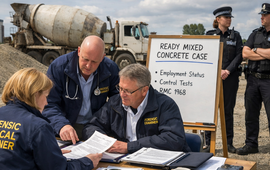
IR35 is not new, but its impact on medium and large businesses has only grown since the off-payroll rules changed for the private sector in April 2021.
If you hire contractors or temporary workers, understanding IR35 is essential. Get it wrong and your business could be liable to HMRC for unpaid tax, interest and penalties.
Here’s what you need to know, and what you can do to stay compliant in 2025.
Understanding IR35
IR35 is the common term for the off-payroll working rules, which are designed to identify whether a contractor’s engagement is genuinely self-employed, referred to as outside IR35, or whether it’s a “deemed employment,” referred to as inside IR35.
The legislation applies when a contractor provides services through an intermediary, such as a partnership or, more commonly, a limited company - sometimes referred to as a personal service company or PSC. IR35 is not relevant for sole traders.
Where a hiring firm is medium or large, and an engagement is deemed “inside IR35”, Income Tax and National Insurance Contributions (NICs) must be paid by the firm on the payment made for the services. If the engagement is deemed “outside IR35”, payments can be made gross to the PSC, without tax deductions by the hiring firm.
If the hiring firm is small, then the original intermediaries legislation applies, and the PSC can be paid gross by the hiring firm, leaving the responsibility (and tax liability) for determining IR35 status and relevant tax deductions to the PSC.
What changed in the private sector in 2021?
Before April 2021, contractors in the private sector were responsible for determining their own IR35 status. That changed with the introduction of the 2021 off-payroll reforms.
Responsibility now lies with the hiring firm, referred to as “the client”. If your business is classified as medium or large under the Companies Act, and you hire contractors, you should determine the IR35 status of each contractor engagement and ensure the correct taxes are being paid for engagements that are “deemed employment.”
Note: If your firm is classified as small, the original intermediaries legislation still applies (see above).
The rules also include provisions for the hiring firm to create a Status Determination Statement (SDS), and also responsibility for handling any disagreements through a formal dispute process.
Why IR35 Still Matters in 2025
IR35 compliance isn’t a one-time task. It’s an ongoing legal duty. If your business uses off-payroll workers, you must continue to apply the rules for each engagement.
HMRC has increased its compliance activity, which includes requesting evidence of how status decisions were made. Incorrect or poorly evidenced determinations can result in protracted and expensive compliance checks, potentially resulting in backdated tax liabilities.
Many businesses are still relying on outdated or informal approaches, for example, assuming the contractual terms are not important when determining status. In reality, the contract is of primary importance, to be considered in conjunction with the working practices.
Where IR35 compliance is lacking, firms are putting themselves at risk. But, be reassured, strong evidential compliance helps significantly minimise that risk.
When to Carry Out an IR35 Assessment
You need to assess IR35 status whenever you engage a contractor who is operating via an intermediary. You also need to reassess if the contract changes, because the law applies based on a single engagement basis.
Determining IR35 status requires considering multiple factors. You need to consider and apply the complex case law on matters relating to control, substitution and a multitude of other relevant factors, including financial risk, equipment, and whether they are operating in business on their own account.
How to Get a Status Determination Statement
A Status Determination Statement (SDS) is a statement that outlines your IR35 status conclusion, which must have been reached using reasonable care,and also contains the reasons for the conclusion.
To produce a statement that meets the reasonable care criteria for an SDS, you will need a methodical and evidence-based approach. This should include a detailed assessment of both the written contract and the actual working arrangements.
You can complete assessments manually, but this is time-consuming, inconsistent, and difficult to scale. Many businesses now utilise professional tools specifically designed to support accurate and repeatable IR35 assessments. These tools help identify the relevant factors, apply case law-based logic, and generate a documented SDS that meets the requirements outlined in the legislation.
Specialist IR35 platforms, such as those offered by IR35 Shield, go beyond simply helping clients produce SDSs by providing audit trails, expert input, contract reviews, and ongoing compliance support, ensuring your decisions are correct and defendable.
What IR35 Compliance Means for Your Business
IR35 compliance is more than just a legal requirement - it’s a way to protect your business.
Failing to apply the rules properly can lead to tax investigations, disputes with contractors, and damage to one's reputation. You need a robust and consistent process that reflects real-world working conditions, not assumptions.
The most common mistakes include using basic employee-like or labour-supply contract templates, ignoring working practices, or relying on tools that don’t consider key employment tests. A lackadaisical approach won’t satisfy HMRC, and won’t protect your business.
How IR35 Shield Can Help
IR35 Shield offers expert-led solutions that help significantly minimise the risk and uncertainty associated with compliance. We support medium and large businesses across a wide range of sectors with software and contract expertise that is designed to help you assess engagements quickly and robustly, generate SDS documents, and maintain comprehensive compliance records.
If HMRC raises a challenge, our team can also provide defence support. And, through our IR35 Academy, your internal teams can gain the knowledge they need to manage IR35 with confidence, together with proof that training has been undertaken.
Get Ahead of IR35 Compliance
If you’re looking for help with your IR35 status results, or further compliance assistance, book a call with our team today to find out how IR35 Shield can help you meet your obligations and protect your business from avoidable tax risk.



